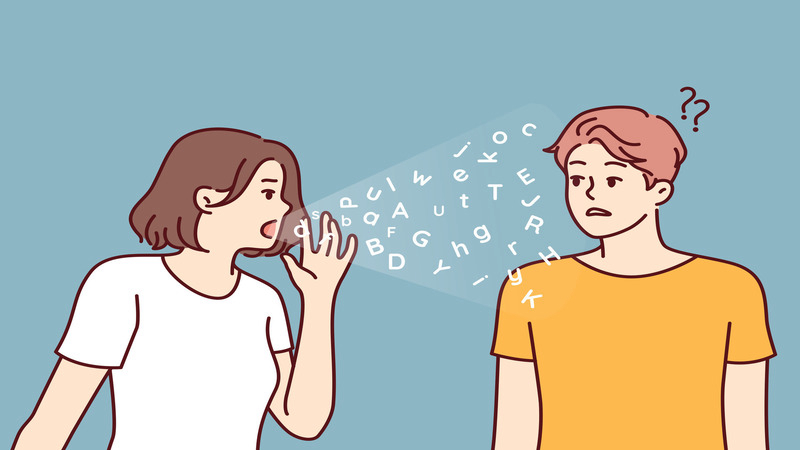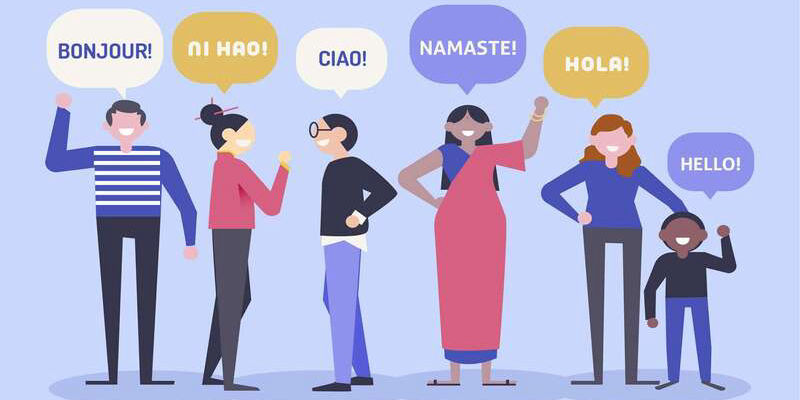Many international students face hurdles due to language differences. Since fluency in English is key to academic and professional success, having the right approach is crucial. This guide will equip you with powerful strategies and a winning mindset to overcome these challenges and thrive in an English-speaking environment.
Understanding the Language Barrier
Imagine a conversation where words lose their meaning. This is the essence of a language barrier. It can occur in any communication form - emails, lectures, reports - and hinders effective teamwork as ideas get lost in translation.
In simpler terms, a language barrier is anything that prevents clear understanding. This can be due to different native languages, cultural expressions, specialized jargon, or even speech difficulties.
The key is to recognize these barriers and develop strategies to bridge the gap. Effective communication, regardless of language, relies on the ability to clearly convey ideas and confirm everyone is on the same page.
The Many Faces of Language Barriers
Beyond Accents: Different Languages and Dialects
We've all encountered the classic language barrier - folks speaking different native tongues. Dialects within the same language can also create communication gaps. Take India, with its 22 major languages and 720+ dialects! Even slight variations can lead to misunderstandings.
Jargon: When Your Industry Speaks a Different Language
Specialized fields often have their own "jargon" - technical terms that fly over the heads of outsiders. Imagine Nulab's developers using complex coding terms with the marketing team. Without clear communication, departments can become misaligned, hindering overall goals.
Beyond Words: Language Disabilities and Communication Challenges
Language disabilities like stuttering, dysphonia, or hearing loss can create communication hurdles. While they don't affect someone's ability to do their job, they can make interaction more effortful.

The Written Word: When Clarity Can Get Lost
Writing isn't always a perfect reflection of speaking. In person, gestures and surroundings add context. Misunderstandings are easier to clear up when you can point or act things out. But written text, with its reliance on words, punctuation, and phrasing, can be misinterpreted. Remember P.T. Barnum's "Giant Man Eating Chicken"? Written language can be tricky!
Company Lingo: Cracking the Code of Internal Communication
Many companies develop their own "corporate language" of acronyms and jargon. While existing employees navigate it easily, newcomers need time to decode it. Without understanding this internal language, new hires might struggle to grasp company goals and expectations.
Here are a few types of language barriers you might face!
Academic Hurdles: This isn't just about following lectures. Understanding assignments, composing essays, and acing exams all become more challenging with a language barrier. While universities require proficiency tests, academic English can be a whole new beast!
Social Struggles: Your social life isn't immune either. Imagine being in a non-English speaking country - chances are, conversations outside class won't be in English. Even if your courses are English-based, students often default to their native language. This can make building a social circle difficult, especially if the local language isn't English (like in Australia).
The Upward Climb: Don't be discouraged! These challenges are common, and there are solutions (spoiler alert: essay writing services aren't the answer!). We'll explore effective strategies to conquer these language barriers and thrive in your academic and social life.
How Language Barriers Impact Mental Health
Feeling lost in a world of words you can't understand? That's linguistic isolation, and it can take a toll on your mind. Language is more than just communication; it's how we connect, build identities, and navigate the world. When that bridge is broken by language barriers, a range of psychological issues can arise.
We're social creatures, and meaningful conversations fuel our emotional well-being. When language makes it hard to connect, feelings of loneliness and isolation can set in. This lack of social support not only makes you feel like an outsider, but it's also linked to issues like depression and anxiety.
Imagine everyday tasks like going to the doctor or using public transport becoming stressful because you can't communicate effectively. This constant struggle can chip away at your self-confidence, making you doubt your ability to handle even simple situations. Over time, this can lead to anxiety disorders and a heightened sense of vulnerability.

For people already battling mental health issues, language barriers add another layer of difficulty. Communicating in an unfamiliar language can worsen symptoms and make recovery even harder. Additionally, it might be difficult to seek help or explain your experiences, creating a barrier to accessing essential mental health services. This lack of support further reinforces the cycle of isolation and mental health decline.
The impact of linguistic isolation goes beyond the person experiencing it. Children raised in such environments may struggle in school and socially, hindering their development and future opportunities. Adults might face limited employment options and economic mobility, contributing to social and economic inequality.
Linguistic isolation is a complex issue with serious mental health consequences. By creating better access to language learning resources and support services, we can build more inclusive communities. This fosters mental well-being and social cohesion for everyone, regardless of their native language.
Here, we will offer a few effective tips and ways to overcome language barriers.
Embrace the Dive: Language immersion is your secret weapon! Go beyond textbooks. Strike up conversations with locals, join language exchange programs, or dive into cultural events. Surrounding yourself with English will boost your comfort, pronunciation, and vocabulary. Don't shy away from mistakes - they're stepping stones to fluency! Binge-watch movies, listen to podcasts, or devour books in English.
Build Your Support Squad: Feeling lost in translation? Don't go it alone! Connect with fellow international students or friendly native speakers who can offer guidance. Language clubs and conversation groups are your practice grounds - speak freely in a supportive environment. Plus, tap into your university's resources! Explore ESL courses, writing centers, or tutoring services. These experts are there to empower your language journey.
Master the Unspoken Language: Communication is a two-way street, and body language paves the way. Learn to "read the room" by observing how native speakers use gestures, facial expressions, and eye contact. Try mirroring their behavior to enhance your message. Remember, a smile, attentive listening, and open body language go a long way. Visual aids like diagrams or illustrations can also be powerful tools to bridge the gap and ensure everyone's on the same page.
Conclusion
Studying abroad is an enriching experience, but language barriers can pose a hurdle. Fear not! With perseverance, dedication, and a positive attitude, you can triumph over these challenges and flourish in your academic journey. Remember, even small strides lead to significant progress. Embrace the challenge, and you'll be amazed at how far you can go!
